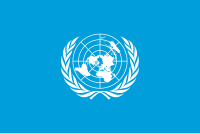
Photo from wikipedia
The history of the millennium development goals (MDGs), the achievement of which experienced a major setback with the outbreak of the 2008 global economic and financial crisis, may provide some… Click to show full abstract
The history of the millennium development goals (MDGs), the achievement of which experienced a major setback with the outbreak of the 2008 global economic and financial crisis, may provide some useful insights on the global partnership for the sustainable development goals (SDGs). There is a vast literature devoted to the MDGs. Most of the analysis is focused on the implementation and progress made toward achieving the MDGs. Fewer authors explore reasons for shortfalls or describe intrinsic limitations to the MDG framework, including limitations in the development, formulation and content of the MDGs themselves. This article reviews cooperation on the MDGs, exploring the priorities of different stakeholders and the challenges to progress inthe broader context of development and global governance.The review focuses on MDG 8, developing a global partnership for development. Added to the MDGs due to Kofi Annan’s leadership, MDG 8 helped to attract support from developing countries which viewed the MDGs as reflecting a one-sided deal favouring the interests of rich countries. Inclusion of the goal to reform the international economic system appeased some critics of the international development goals that were put forward by the Organisation for Economic Co-operation and Development (OECD) and taken as the basis for the MDGs. This article argues that despite the endeavour by the United Nations (UN) General Assembly to steer the development of global partnerships, extrinsic barriers such as lack of political will on the part of the key stakeholders, the financial crisis, and vested interests prevented deliveryon MDG 8’s key target ofdeveloping an open, predictable, rule-based, non-discriminatory trading and economic system. Achievement of this goal is necessary in order to create the equitable and inclusive international order demanded by developing countries for decades. Most markedly, a lack of progress on MDG 8’s goal of addressing systemic issues of global economic governance became the greatest challenge to achieving the MDGs, and the greatest disappointment. Systemic problems were inherited by the SDGs, the achievement of which requires a truly global partnership able to build a new economic order as a foundation for inclusive and sustainable development. This review draws on content analysis of General Assembly resolutions and the official records of its 55th to 70th sessions, documents from the three conferences on financing for development, the crisis summit, reports on MDG results, and public statements and analytical narratives about the MDGs
Journal Title: International Organisations Research Journal
Year Published: 2020
Link to full text (if available)
Share on Social Media: Sign Up to like & get
recommendations!